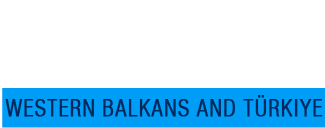Report from the Introductory Online Workshop on Artificial Intelligence for Journalists

The workshop is part of the capacity-building activities implemented by Thomson Media within the project “Strengthening Quality Journalism in the Western Balkans and Türkiye II,” which supports efforts to improve journalism standards and press freedom in the region.

The sessions were led by Branislava Lovre, a journalist and AI ethics consultant with experience in both journalism and emerging technologies. She guided participants through key AI concepts, focusing on their practical application in newsroom environments. Her clear and structured approach, combined with interactive exercises, helped participants develop a better understanding of generative AI tools and how to use them responsibly in journalistic work.
What made this workshop truly stand out was its interactive and practice-driven format. Participants didn’t just listen to lectures, they actively applied AI tools, worked on real-life newsroom scenarios, and collaborated in breakout rooms to brainstorm ethical dilemmas, test AI tools, and draft concrete policies. From the very beginning, Branislava emphasized the importance of critical and confident engagement with AI, moving beyond fear and hype to smart, ethical application.
Throughout the training, participants explored AI applications relevant to reporting, editing, fact-checking, and multimedia production. Branislava guided participants through key AI concepts and their practical application in newsroom environments. Using step-by-step presentations, she demonstrated tools such as Otter, Consensus, HuggingChat, Gamma, Firefly, and Hemingway, providing clear guidance on when and how to use each one responsibly. The training also included a segment on drafting AI policies tailored to participants’ own newsrooms, encouraging them to combine ethical principles, editorial standards, and practical needs into actionable frameworks.
In addition to tool exploration, participants engaged in group exercises, interactive quizzes, and reflection tasks, allowing them to deepen their understanding of AI’s potential and pitfalls. They learned how to label AI-generated content transparently, how to navigate upcoming legal frameworks such as the EU AI Act, and how to ensure human oversight remains central to editorial decisions. The breakout tasks sparked lively debate and peer learning, and several participants shared their early ideas for integrating AI into their organizations.
What participants appreciated most was not just the technical content, but the confidence-building atmosphere Branislava created. Her supportive facilitation style encouraged curiosity, experimentation, and open exchange of ideas. She consistently reminded the group that access to AI tools is just one part of the equation, what matters most is how we approach them, with ethical awareness, editorial judgement, and journalistic integrity.
By the end of the workshop, participants felt not only better informed but also empowered, ready to test, question, and use AI responsibly in their own work. The diverse group of experienced journalists, editors, freelancers, and younger media professionals created a dynamic learning environment, where people learned as much from each other as they did from the trainer. Thanks to Branislava’s expert guidance and thoughtfully structured sessions, the workshop did more than raise awareness, it provided a foundation for more informed and ethical integration of AI in journalistic practice.

